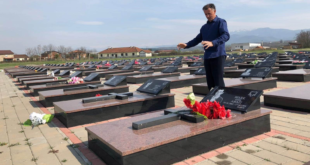Seven Montenegrin municipalities were offered multi-million-euro grants in 2012 to build essential wastewater treatment plants to prevent sewage polluting rivers and the sea, but no construction work has begun yet, and as years pass, the potential cost keeps rising.
Rozaje was intended to be one of the first municipalities in Montenegro to get a wastewater treatment plant to process domestic sewage in order to ensure that the water that is discharged into rivers, lakes and the Adriatic Sea is relatively clean.
From 2011 to 2014, the municipal authorities in Rozaje managed to conduct a feasibility study for the plant, select a location and include it in the municipality’s urban spatial plan.
The next phase was the construction of the wastewater treatment system. A grant of 200,000 euros was provided from the European Union’s Instrument for Pre-Accession Assistance, IPA, for a feasibility study; the municipality of Rozaje also borrowed around 2.8 million euros from the European Investment Bank for the construction, while a grant of 700,000 euros was provided from the European Fund for the Western Balkans.
But in 2014, the Democratic Party of Socialists, which had run Rozaje for two decades, lost power in the municipality.
The new municipal authorities, led by the Bosniak Party and the Social Democratic Party, then suddenly decided to build the wastewater treatment plant at another location.
As a result, the site study had to be carried out again but the new authorities could not get the money from the EU’s IPA fund. The money was instead diverted to resolving wastewater issues in other municipalities which were more prepared to build plants.
The municipality of Rozaje told BIRN and the Center for Investigative Journalism of Montenegro, CIN CG, that the reason for the change of location was because the facility would have been too expensive at the original site because a pumping station would also need to be built there.
“Although the study predicted that [original] location was the best, it was considered that this solution should be abandoned,” the municipality said.]
This is just one example of how several Montenegrin municipalities have been left without wastewater treatment plants due to poor decisions by the local authorities, which have also failed to take advantage of the money that was granted to them for the projects.
BIRN/CIN CG’s research shows that seven Montenegrin municipalities – Rozaje, Plav, Bijelo Polje, Kolašin, Danilovgrad, Cetinje and Ulcinj – lost the chance to receive more than ten million euros that had been pledged through grant schemes for the construction of the wastewater treatment plants.
The municipalities’ failure to build the plants will also cost Montenegro’s state budget almost 20 million euros, because years of delays have led to increased costs for construction.
The construction of the wastewater treatment plants is one of the obligations to which Montenegro has committed itself while negotiating Chapter 27 of the body of legislation that the country has to harmonise with EU standards in order to move towards membership of the bloc – the chapter covering the environment and climate change.
As Montenegro’s membership negotiations continue, the plants still have to be built, although they will cost the municipalities much more than previously planned.
Delay means more river and sea pollution
Azra Vukovic, executive director of the Montenegrin environmental NGO Green Home, told BIRN/CIN CG that any delay in the implementation of projects to build wastewater treatment plants contributes to the deterioration of the quality of water in the country’s watercourses and increased concentrations of pollutants, and has a negative impact on river and marine life. She also argued that pollution has an indirect impact on public health.
“The lack of spatial planning documentation, the lack of project documentation, the lack of human capacity to lead these processes and the lack of financial resources that needed to be provided in order to use donor or credit funds are just some of the reasons that prevented the implementation of these projects,” Vukovic explained.
She argued that there are several reasons for the problems that have arisen. One of them, she believes, is the lack of capacity at the local level to prepare and lead such large and demanding projects. Local authorities, do not sufficiently recognise the importance of such projects, she said – particularly because their implementation is a long and demanding process.
In some towns, there is also the problem of “illegally constructed buildings at the location intended for the construction of the plant”, Vukovic added. Sometimes extra cost is also incurred because land needed for the plants is privately owned and has to be bought by the municipality.
“Another reason for these projects slowing down lies in the fact that local authorities often do not want to implement projects that will ultimately produce an obligation for citizens to pay additional fees for such services, and therefore they prolong their implementation,” she claimed.
Wastewater flowing into the River Ibar
The municipality of Rozaje, after losing its initial funds from the EU’s IPA, was fortunate enough to get money for the construction of the plant again in 2019.
However, whilet over three million euros were initially allocated to build the plant, the government’s Municipal Wastewater Management Plan for 2020-2035 estimates that it will now cost just over five million. Along with the construction of a new sewerage network for the town, it is estimated that the total cost could go up to 12 million euros.
PROCON, a government-established unit for implementing utilities and environmental protection projects, said that the construction of a system for collecting, draining and treating municipal wastewater is one of the main priorities when it comes to environmental protection.
Wastewater from Rozaje is currently flowing into the River Ibar, about ten kilometres from its source. According to water quality monitoring by the Environmental Protection Agency, in 2018, the Ibar was among the most polluted rivers in Montenegro.
“This [treatment plant] project aims to improve the treatment of wastewater in the area of Rozaje, and thus reduce the negative effects of pollution of the River Ibar,” said PROCON.
The municipality of Rozaje said that the wastewater project now has “a high degree of readiness for financing”, but that the municipality needs more assistance because “this project, in terms of its scope, significance and value, exceeds our current organisational and financial capabilities”.
Unresolved financing issues
A total of 5.2 million euros were allocated by 2012 for the construction of a plant to serve the municipalities of Plav and Gusinje – more almost five million through the EU’s IPA pre-accession programme, and the rest in a loan from the European Investment Bank.
The plant, however, was not built, and the money allocated through the IPA programme was not handed over. Currently, wastewater in the Plav municipality is discharged into the rivers Lim, Vruja and Grncar without being treated beforehand. In 2012, the validity of the study on the impact of the plant on the environment expired. Due to the municipality’s inability to take a loan, it remains uncertain when the project will begin.
The municipality of Plav claims that work on the preparatory documentation for the plant began at a time when it was also responsible for the local community in Gusinje, which later received the status of a municipality.
After Gusinje became a municipality, its representatives expressed reservations about the plan. “They did not agree with the proposed solutions, because all populated areas were not covered by the planned works,” the Plav municipality said.
The Montenegrin government’s Municipal and Wastewater Management Plan states that the plant, which would deal with the wastewater from both Plav and Gusinje, would cost about 4.2 million euros – one million less than in the previous plan. However, it is uncertain how the municipalities will get this money.
“The project is planned to be financed through a credit arrangement with the EIB [European Investment Bank], but as municipalities are not able to borrow, defining the financial structure of the project is an open question at this time,” PROCON said.
Opposition to plant construction in Danilovgrad
The construction of a wastewater treatment plant in Danilovgrad has sparked a dispute between the settlement of Landza, the intended site of the plant, and the municipality. Danilovgrad’s sewage currently flows directly into the River Zeta, although its waters and banks were declared a ‘natural park’ by the government in 2019.
This caused locals in Danilovgrad to launch a campaign to stop the plant being built at the site, which is a few hundred metres from houses, kindergartens, primary schools and the local health centre.
The project was launched about ten years ago but the campaign for the plant to be built elsewhere has stalled the construction. “As a group of citizens opposes the construction of the WWTP at the planned location of Landza, and the contractor has already been contracted, a solution has yet to be found,” PROCON said.
Back in 2010, the state of Montenegro signed a contract with the European Bank for Reconstruction and Development to borrow 5.35 million euros to build the plant in Danilovgrad. According to a 2012 PROCON report, 960,000 euros were set aside for the construction of the plant, while almost three million were set aside for the construction of the wastewater collector and sewerage network. But since then, the costs have increased significantly.
At the project’s presentation on September 9 this year, the municipality of Danilovgrad said that the contract with the contractor had already been signed and that a change of location could lead to international arbitration and cost the state money. The European Bank for Reconstruction and Development announced at the meeting that it had blocked the funds for the plant a few months beforehand.
Municipalities seek more money
By 2012, 1.2 million euros had been earmarked to build a wastewater treatment plant in the municipality of Kolašin. Almost one million euros was a loan with the European Investment Bank, while 200,000 euros were provided from EU pre-accession funds for the development of the project.
The project has been developed, but the municipality of Kolašin has not yet managed to provide funds to take it any further, and it has not yet been built. PROCON said that the municipality was not able to borrow on a larger scale in order to implement the project. Now, with the support of the state and PROCON, it has prepared an application to international financiers.
In the Cetinje municipality, 6.4 million euros was set aside to build a wastewater treatment plant in the village of Dobrsko Selo, most of it in the form of loans from the European Investment Bank, plus more than 1.6 million in grants from the Western Balkans Investment Fund.
So far, it has not been built. PROCON said that there are still several unresolved issues connected to the location for the plant and some of the routes for bringing wastewater from the city. Other sources of financing are also needed.
The project to build the plant and its accompanying infrastructure is directly connected to the project for the drainage of flood and rain waters from the city, through a tunnel to be constructed in Belveder, a location a few kilometres outside the city.
However, the Cetinje municipality said that the municipal Public Works Administration has not yet announced a tender for the construction of the tunnel, which is why the tender for the plant has not been completed yet.
“We must emphasise that we do not have information about when the Public Works Administration plans to announce a tender and realise the works that are a precondition for the realisation of activities on the design and construction of the WWTP,” the municipality said.
The Public Works Administration did not answer BIRN/CIN CG’s questions about when it will announce the tender for the tunnel.
Delays and illegal constructions
The municipality of Bijelo Polje, like the municipalities of Rozaje and Plav, has lost access to money from the EU’s pre-accession IPA fund to build its wastewater treatment plant because of delays. Bijelo Polje was allocated 1.7 million euros but was not able to borrow the additional amount needed to complete the funding and start the project.
In addition to that money, another 2.3 million euros in loans were secured from the European Investment Bank and 700,000 euros from the Western Balkans Investment Fund.
However, of all the municipalities whose projects have seen delays, Bijelo Polje has progressed the furthest and it is expected that by the end of the year, it will announce a tender for the design and construction of its wastewater treatment plant.
“It is realistic to expect that the tender will be announced in the next few months,” the municipality said in mid-September.
Meanwhile in the municipality of Ulcinj, although more than six million euros were provided for the construction of a wastewater treatment plant in 2012, the project was in deadlock until the end of last year.
According to estimates made by the municipality, about 15 million euros will be needed for the construction of the plant. But an even greater problem than the financing is the location for the construction of the plant.
During the ten years of waiting for the construction of the plant, several illegal facilities were built at the site. The municipality of Ulcinj said it is currently working on “an analysis on overcoming this situation”.
Montenegro faces 2035 deadline
As a candidate for EU membership, Montenegro opened negotiating Chapter 27 at the end of 2018. Water quality is one of the criteria that Montenegro has to meet, with the obligation to build systems for the collection and treatment of wastewater in all its municipalities by the end of 2035.
Environmental activist Azra Vukovic said that about 47 per cent of the population of Montenegro is currently served by wastewater collection services. The treatment plants that do exist are also not working to their full capacity to treat wastewater, she warned.
“However, the biggest problem is in those municipalities where plants do not exist and the collected wastewater is discharged directly into the sea or other water recipients,” Vukovic said.
“By discharging untreated wastewater, various substances enter our rivers and seas that have negative impacts on water quality, but also on the aquatic organisms that live in them.”
 Eurasia Press & News
Eurasia Press & News




